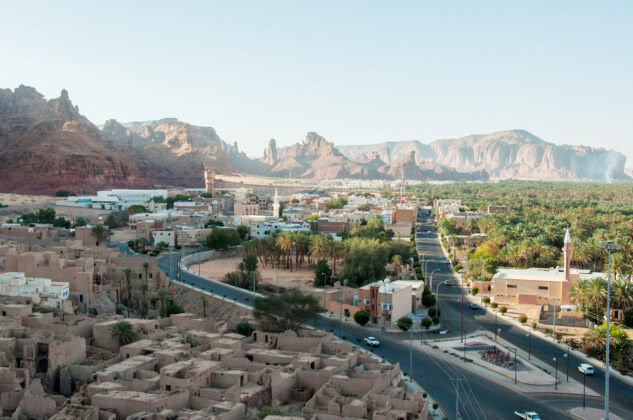The Saudi Vision 2030: A catalyst for growth
Saudi Arabia’s Vision 2030 promises an abundance of enticing initiatives to expats, moving away from the Kingdom’s dependence on oil and towards attracting foreign investment and business growth. The multifaceted initiative aims to position Saudi Arabia as a global hub by 2030, as the government expands the entertainment and tourism sectors in an effort to diversify the economy. This focus extends through to marketing, advertising and the creative industries, which are witnessing substantial growth in line with the goals of the Saudi Vision. In turn, this is opening the employment landscape to accommodate marketing agencies, digital marketing specialists and creative professionals from overseas.

Attraction from international businesses looking to expand into the Middle East has ushered in new opportunities within the technology and manufacturing sectors. From Tesla’s establishment of an electric vehicle manufacturing facility to Amazon’s opening of research and development centres, the country is pulling in significant foreign investment. Further expanding these sectors, an ambitious initiative named NEOM is seeing the development of a futuristic city in the Northwest. This project will open further job opportunities to assignees, driving the country’s aspirations to become a global hub for innovation.
This huge diversification of Saudi Arabia’s economy, and rapid growth in numerous sectors including entertainment, technology, transport and construction, presents a wealth of opportunity for assignees looking to relocate to the destination.

Corporate shifts and expansion
In tandem with the accelerated growth in numerous industries, Crown is witnessing trends indicating a significant pickup of corporate interest. We spoke to Sanaa Rejeb from Crown World Mobility in UAE to hear what this growth in demand means for mobility companies and assignees alike.
“Organisations are increasingly looking to open new branches and transfer employees over to Saudi Arabia, particularly those from the United Arab Emirates. Crown have seen a 43% increase in enquiries from the UAE to relocate to the KSA, which is a testament to the popularity of the destination for corporates.”
“This growth in demand is necessitating comprehensive relocation services to ensure a smooth transition for employees and their families. Crown’s services encompass all aspects of the relocation process, from supporting with home searches and the transfer of offices, to offering intercultural training, helping assignees assimilate into a new environment.”
Mitigating challenges
Despite the evident allure to businesses and employees alike, relocating to Saudi Arabia is not without its challenges. For instance, there are logistical barriers such as housing shortages, where assignees may face long waiting lists for accommodation and schooling options, with the demand dominating the supply.
There are significant socio-political differences that assignees and visitors alike should be mindful of, for instance, the presence of gender segregation within day-to-day Saudi life, with physical separation often being commonplace in professional settings. However, change is occurring, particularly in more metropolitan areas, with the Saudi Government encouraging women into the workplace as part of economic reform. Similarly, whilst there may be variations in tolerance between cities and states, same-sex sexual activity is illegal, and there is little protection from discrimination or even hate crimes. Saudi society is very traditionalist and values sexual privacy and honour, with rigid binary gender roles reinforced by norms throughout almost all elements of Saudi society.

Relocation companies can support assignees moving to Saudi in numerous ways to help mitigate these challenges. Firstly, they can review the allowances and benefits provided to ensure they are “fit” for the destination, for example, whether assignees are likely to live in compound type accommodation. Companies can then ensure that the assignee is aware of this and that housing allowances reflect these areas. From an immigration perspective, if there are issues with non-married or same sex partners unable to accompany the assignee, companies can suggest extra home leave trips and ensure that the assignee is aware of the laws and restrictions around sexual activity, should partners wish to visit the assignee.
Overall, ensuring that the assignee is provided with cultural training that will cover not only these social norms but also any actual restrictions facing assignees, such as dress codes, male/female interactions, should be prioritised.
Saana Rejeb - Crown World Mobility, UAEExpats are the minority at present, with the local population comprising the majority, and whilst this challenge is not unique to the country itself, intercultural training is crucial to help mitigate these difficulties.
Crown’s consultants are on the ground provide training to aid those relocating in communicating, working and understanding their new environment, helping to navigate religious social etiquette and general cultural nuances.
Looking ahead
As Saudi Arabia continues its journey towards becoming a global relocation destination, undergoing rapid transformation, stakeholders are cautiously optimistic about the prospects.
Relocation to Saudi Arabia presents both attractive opportunities and cultural challenges for international workers and their families. Yet, with the right intercultural training, these hurdles can be mitigated, and a smooth transition can be ensured. The success of Vision 2030 hinges on striking a balance between economic development and preserving the country’s cultural identity, as Saudi Arabia continues to emerge as a beacon of opportunity and innovation.
Client login
Use the log in below to access a generic version of our customer portal. For client specific versions of the portal see communications from your Crown consultant.
You May Also Be Interested In
Mobility Trends 2024: from AI to assignment apathy
Download our expert report today and discover emerging policy trends
2024 Mobility Trends: Is relocation still a tool for improving employee engagement?
Download our expert report today and explore the evolving relationship between employee engagement and corporate relocation
Culture Talks by Crown World Mobility
In our podcast Culture Talks, we use stories and experiences, to bust myths around culture and spotlight its importance, especially when it comes to relocating around the world and moving abroad.
Immigration weekly update: November 21, 2024
Immigration news updates for Hong Kong and Japan




